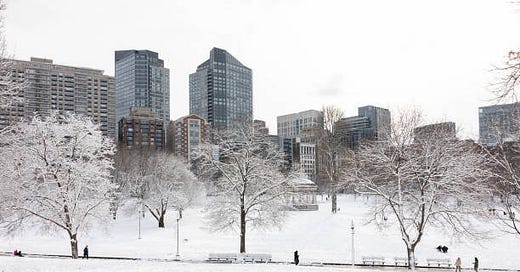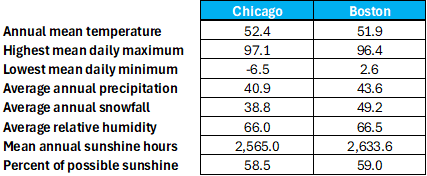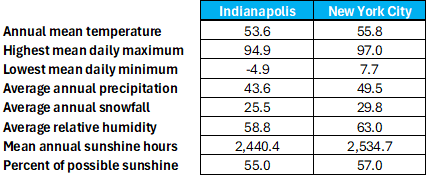Is this Chicago? Nope. It’s Boston. The East Coast city that gets 20 percent more snow annually on average than Chicago. Source: gettyimages.com
Every so often I see that someone makes the claim that people are leaving the Midwest because the weather sucks. That claim is bogus.
X poster Hunter (@StatisticUrban) made this claim in a tweet sent Monday:
“Nobody wants to hear this but one of the reasons the midwest is struggling is that the weather just sucks.
It's freezing cold, dark, and snowy in the winter, and hot and humid in the summer. The truly "nice" parts of the year are limited to a few weeks in the spring/fall.”
One parenthetic note, here: the OP’s location on X is given as the United Kingdom. Assuming they are from London, perhaps the best climate in an otherwise climate-challenged nation, I find it odd that someone from a place so cloudy, misty and perpetually cool would make this point. Nonetheless, London’s weather has not kept it from becoming one of the world’s premier global cities.
Let me say I don’t completely disagree with this person. The Midwest’s weather is not, uh, optimal. There are better places climate-wise. And that’s fine. However, it’s not the principal reason people leave the Midwest.
I’ve always maintained that there’s little difference in climate between Midwestern and Northeastern cities. I looked at climate data listed on the Wikipedia page of several cities, and here’s what I found. A quick one-on-one comparison between cities at similar latitudes makes the point. Here in this data comparison of the climates of Boston and Chicago, they’re essentially the same:
The climates of New York City and Indianapolis? The same:
Guess what? Comparing Washington, DC and St. Louis, they’re the same:
In every comparison, there’s virtually no difference in annual precipitation, annual snowfall, record high and record low temperatures, average annual relative humidity, or the amount of annual sunlight and cloudiness. Midwestern cities have slightly higher maximum temperatures and slightly lower minimum temperatures, due to their inland locations. Otherwise, at similar latitudes, the cities are quite comparable.
How about comparing Midwestern cities with some Southern and Western hotspots? No need to create charts for this. I will grant that there is a difference between the Midwest, South and West. The South is warmer, more humid, and has more pleasant winters, but can be subject to devastating hurricanes. The Mountain West and West Coast are also warmer, far more arid, and while they also have more pleasant winters, they are also prone to extreme drought.
We all know why some people choose to leave the Midwest: it’s the economy, stupid. If people are pleased with the economic opportunities of a given city, they’ll deal with whatever the weather brings, within limits. The cities of the East Coast got their starts as ports exporting American goods to Europe, and leveraged that into manufacturing and then the strong knowledge and creative-based economies they enjoy today.
The West Coast, California in particular, was able to add another quality to a fairly similar trajectory. The Golden State showed America that sunshine could be marketed as a quality-of-life amenity that could attract residents. By the 1970s the cities of the Southeast, southern Plains and interior West followed suit. Pipe in enough water and air conditioning, and Phoenix and Miami become much more comfortable and livable.
Welcome to the warm continental climate zone in the Koppen climate classification system. I won’t bore you with the classification specifics, but it’s the climate type that covers the Northeast and Midwest parts of the nation. The Northeast’s version of the climate is somewhat modified by its location along the Atlantic, and the Midwest’s is moderated to a smaller extent by the Great Lakes.
There are two variants to the warm continental climate zone, with hot summer and warm summer versions. In the Midwest the hot summer version is along the southern coasts of the Great Lakes and spreads into the Ohio, Mississippi and Missouri river valleys; the warm summer version can be found in the northern parts of Michigan and Wisconsin and extend into southern Canada. People who don’t think much about climate might consider the hot summer version as “Tornado Alley” and the warm summer version as “basically Canada.”
Globally there are lots of people who live in the warm continental climate zone. Much of eastern Europe, from Poland into western Russia is in the warm summer “Canada” type, while Ukraine and the Caucasus region of western Asia (Georgia, Armenia and Azerbaijan) are similar to our “Tornado Alley” region (but probably without many tornados).
Again, the Midwest’s climate did not keep the region from booming when agriculture, the expansion of the nation’s railroad network, and the rise of manufacturing fueled the region’s growth. However, when quality of life matters like climate became more prominent, it changed the calculus on economic choices.
Any gripe about the Midwest’s weather is a secondary gripe at best. More like, “I can’t find the economic opportunity I want, so I’m leaving. Plus, the weather sucks anyway!”
Next thing you know people will say they leave the Midwest because of its unforgivingly boring landscape. Also bogus.







I moved from Ohio to New Hampshire, and I can confirm you’re correct. It was 97 degrees and humid here in NH yesterday. This after we spent the entire month of February (literally) below 40 degrees. If anything, the climate on the east coast is worse than the Midwest, because we get more snow. But nobody cares. That’s part of the “New England charm”, although that’s highly overrated as well.
Further evidence: you don’t hear people citing the climate as an excuse in midwestern cities that are actually growing, like Columbus or Madison or even Minneapolis. It’s only an excuse in declining cities like Detroit and Cleveland.
I’m not even sure if it’s the case in Detroit or Cleveland. My wife is from Buffalo, which is world famous for its lake effect snow. When you tell someone you’re going to Buffalo, invariably they tell you to watch out for blizzards, even in summer. (I think they’re trying to be clever.) But nobody in Buffalo cares about the snow. They just shovel it out and get on with what they’re doing. I know a lot of people through my wife who have left Buffalo for warmer climates, but in nearly all those cases, the climate itself wasn’t a factor. Most moved for jobs; some moved away for college and never moved back. But I’ve never met anyone who moved to Georgia because they were tired of shoveling snow.
One of our kids, fed up with Indiana winters, decamped for South Carolina and has made a nice life there. We went to visit last June after the birth of their first child. Holy frijoles, was the humidity unbearable. 85 degrees, but two minutes in the air and you've soaked through your shirt. In Indiana, we stay inside most of the winter. In SC, they stay inside most of the spring and summer. I feel like our son just traded one ugly season for a different one.